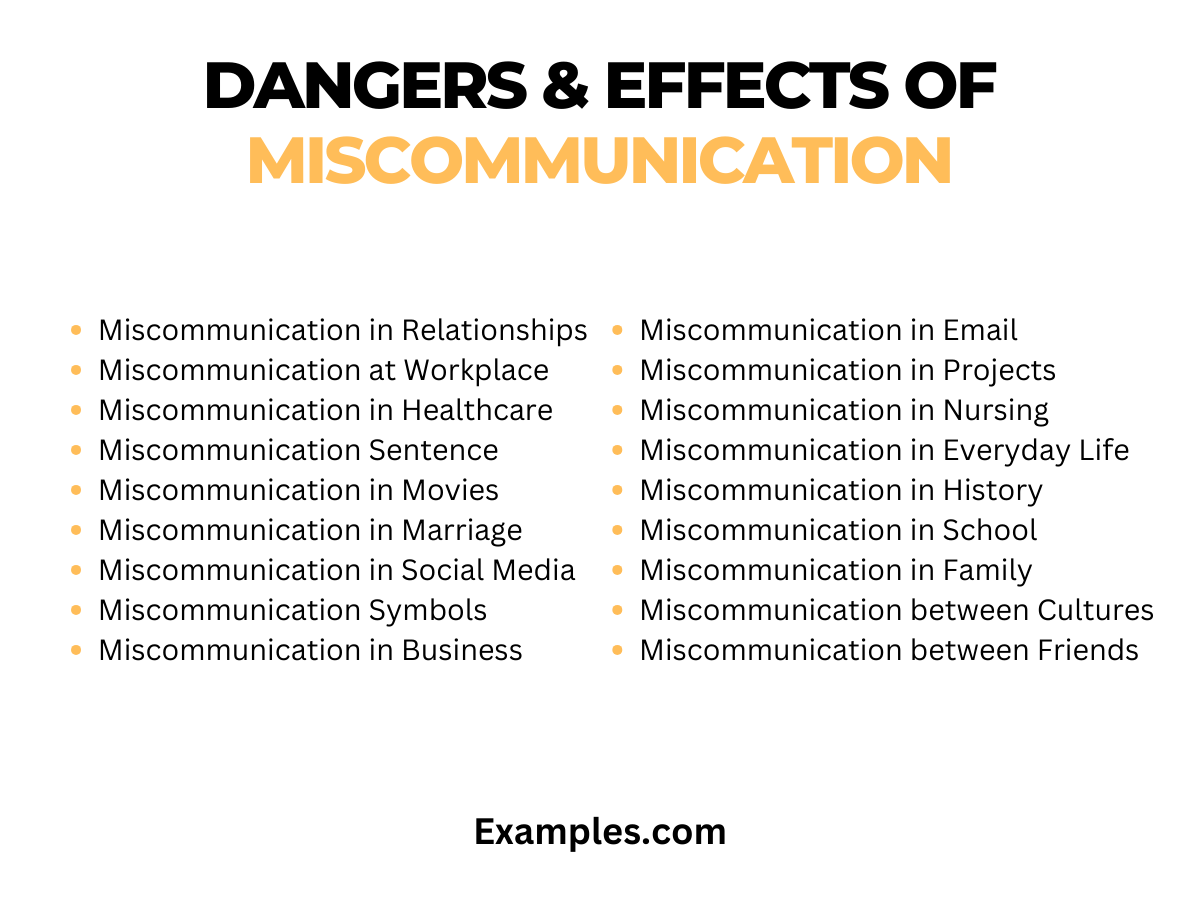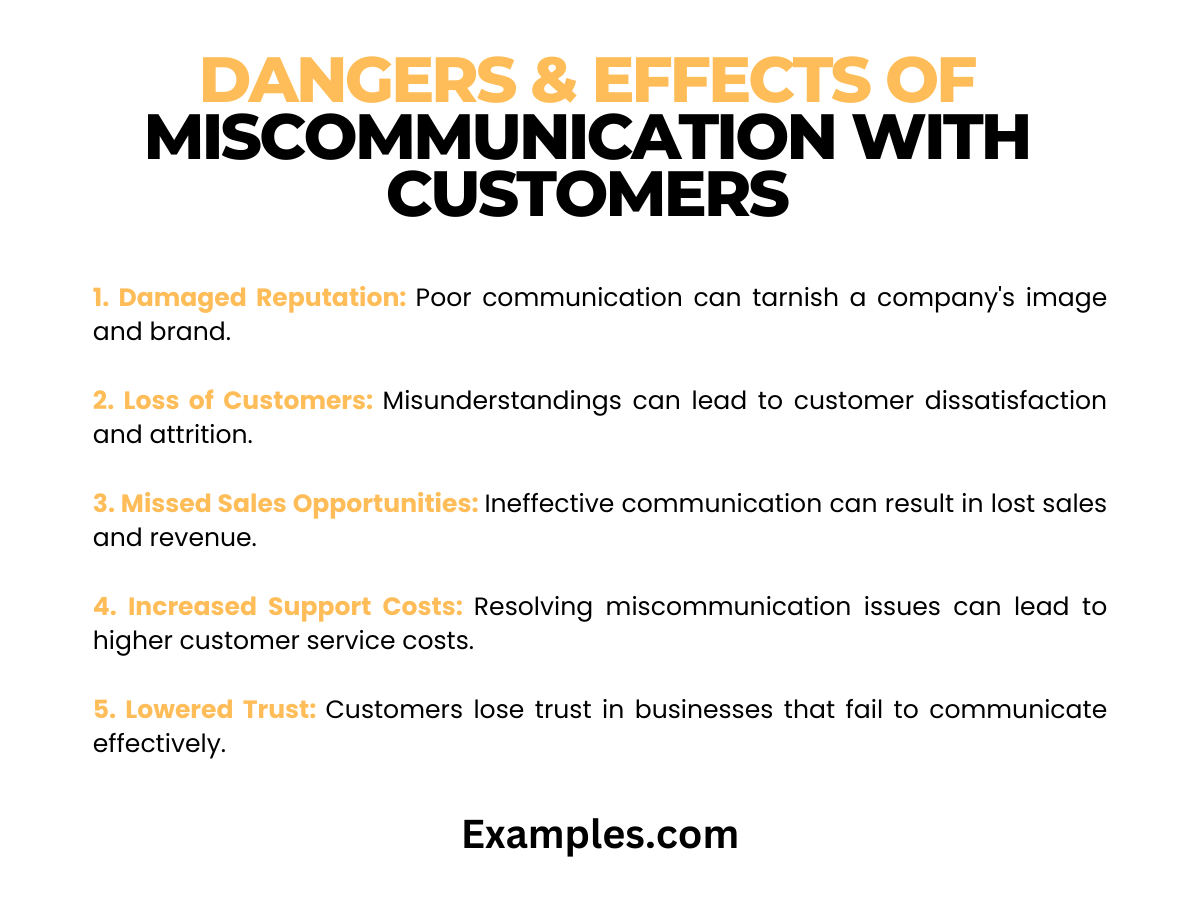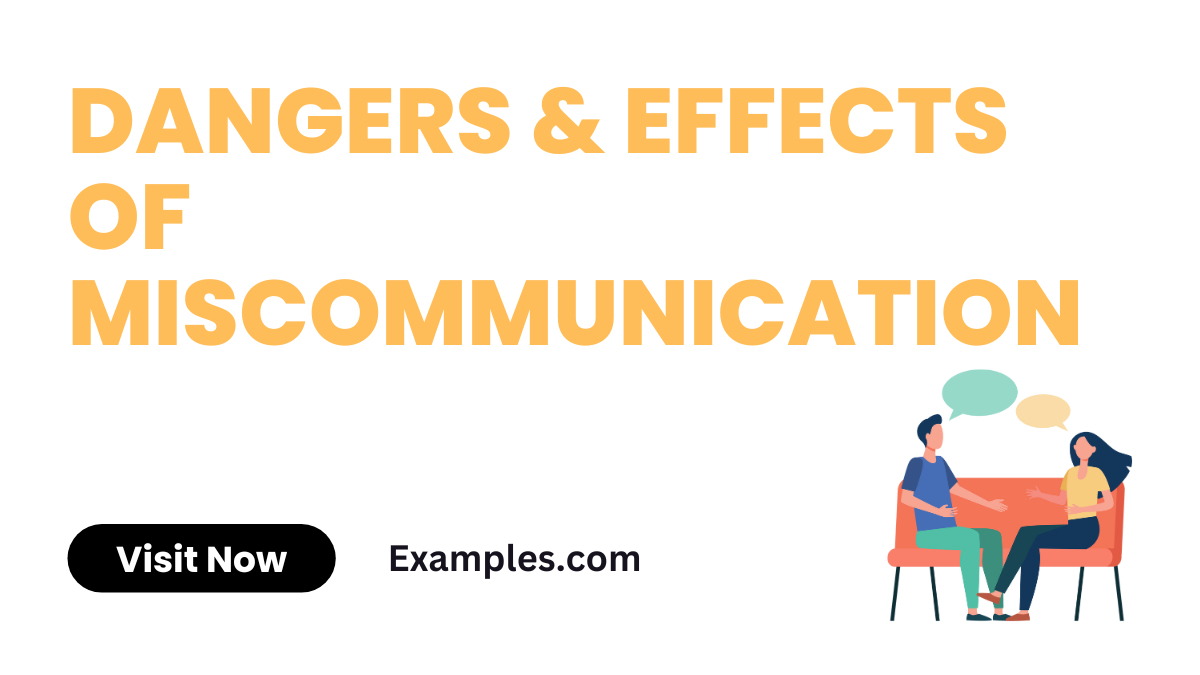Dangers & Effects of Miscommunication
The Dangers & Effects of Miscommunication are far-reaching and multifaceted, impacting every aspect of our personal and professional lives. Miscommunication can lead to conflicts, errors, and missed opportunities, creating an environment of mistrust and inefficiency. This comprehensive guide delves into the various ways miscommunication manifests and its potential repercussions. It also offers valuable strategies and tips to identify, prevent, and address miscommunication, fostering better understanding and collaboration. Whether in relationships, the workplace, or across cultures, understanding the dangers and effects of miscommunication is crucial for successful interactions and outcomes.
20 Dangers & Effects of Miscommunication

Miscommunication can lead to a cascade of issues in personal, professional, and social settings. It often results in confusion, conflict, and decreased productivity, highlighting the need for clear and effective communication strategies. This discussion explores 20 diverse examples of miscommunication, each accompanied by a brief explanation and a suggested communication approach, emphasizing the significance of clarity and understanding in all forms of interaction.
- Miscommunication in Relationships: Misunderstandings often lead to unnecessary arguments.
Example: “I thought you said we’d meet at 7 PM, not 7 AM!” Communicate clearly by confirming plans: “Let’s meet at 7 PM at the café, okay?” - Miscommunication in the Workplace: Results in missed deadlines and project failures.
Example: “I didn’t realize the report was due today.” Use specific language: “The report is due by end of day, March 15th.” - Miscommunication in Healthcare: Can cause incorrect treatments.
Example: “The doctor misinterpreted the symptoms.” Confirm understanding: “So, you’re prescribing this medication for my symptoms, correct?” - Miscommunication Sentence: Leads to confusion over intent.
Example: “I can’t stand working with you!” Clarify emotions: “I find it challenging to work with you because of our differing work styles.” - Miscommunication in Movies: Often a plot device for conflict.
Example: “The character misunderstood the secret message.” In real life, confirm details: “Did you mean to meet at the old theater for the movie?” - Miscommunication in Marriage: Causes unnecessary stress and tension.
Example: “You never listen to me!” Promote open dialogue: “I feel unheard when I talk about my day. Can we discuss this?” - Miscommunication in Texting: Texts can be easily misinterpreted.
Example: “Your text seemed angry.” Use clear language: “I’m feeling frustrated, but I’m not upset with you.” - Miscommunication in Social Media: Leads to misinterpretation of posts or messages.
Example: “I thought your post was about me.” Ask for clarification: “Was your recent post referring to something specific?” - Miscommunication Symbols: Symbols or emojis can be misinterpreted.
Example: “😂 can mean laughter or sarcasm.” Be explicit about your emotions: “I found that really funny 😂 (genuinely laughing).” - Miscommunication in Business: Results in lost deals or partnerships.
Example: “The contract terms were unclear.” Be explicit in agreements: “Let’s outline the specific terms of our contract in this document.” - Miscommunication in Email: Ambiguous emails can lead to misinterpretation.
Example: “Your email seemed abrupt.” Aim for clarity: “To clarify my previous email, I meant to say…” - Miscommunication in Projects: Causes delays and inefficiencies.
Example: “I didn’t know I was leading this task.” Assign clear roles: “You will be leading this task and responsible for its completion.” - Miscommunication in Nursing: Can affect patient care and treatment.
Example: “The nurse misunderstood the medication dosage.” Double-check information: “Just to confirm, this is the correct dosage for the patient?” - Miscommunication in Everyday Life: Leads to minor misunderstandings.
Example: “I thought you were bringing the snacks.” Specify responsibilities: “I will bring the main dish, can you handle the snacks?” - Miscommunication Examples in History: Has led to conflicts and wars.
Example: “Misinterpretation of treaties has sparked conflicts.” In modern settings, ensure mutual understanding: “Let’s review the agreement together to avoid any confusion.” - Miscommunication in School: Affects learning and teacher-student relationships.
Example: “I didn’t understand the assignment.” Ask for clarification: “Can you explain the assignment requirements again?” - Miscommunication in Family: Causes rifts and hurt feelings.
Example: “You never told me about the family gathering!” Communicate regularly: “Let’s update each other about family events weekly.” - Miscommunication between Cultures: Cultural differences can lead to misinterpretation.
Example: “In my culture, that gesture is offensive.” Educate about cultural differences: “In my culture, this means…” - Miscommunication between Friends: Leads to broken friendships.
Example: “I thought you were mad at me.” Express feelings openly: “I felt upset when you canceled our plans last minute.” - Miscommunication between Generations: Different communication styles can cause misunderstandings.
Example: “Grandma doesn’t understand texting slang.” Use universal language: “I’ll call instead of texting to explain better.”
Dangers & Effects of Miscommunication in the Workplace
- Reduced Productivity: Miscommunication can lead to confusion, causing delays and decreased efficiency in task completion.
- Poor Team Dynamics: Lack of clear communication often results in misunderstandings and tensions among team members.
- Increased Errors: Misinterpreted or missed information can lead to critical mistakes in work processes.
- Lower Employee Morale: Consistent miscommunication can lead to frustration and a decline in employee satisfaction.
- Compromised Customer Relationships: Inaccurate or unclear communication with clients can damage business reputation and customer trust.
- Missed Opportunities: Misunderstandings can lead to missed opportunities for growth and innovation.
- Financial Losses: Mistakes stemming from poor communication can have a direct impact on a company’s financial health.
- Legal Issues: Miscommunication can result in non-compliance with regulations, leading to legal repercussions.
Dangers & Effects of Miscommunication in Society
- Social Conflict: Misunderstandings can escalate into conflicts and disrupt social harmony.
- Spread of Misinformation: Incorrect or unclear information can lead to the spread of rumors and false beliefs.
- Political Polarization: Miscommunication in media and politics can deepen societal divisions.
- Public Safety Risks: Miscommunication during emergencies can lead to public panic and safety risks.
- Impaired Learning: Miscommunication in educational settings hinders effective learning and knowledge dissemination.
- Cultural Misunderstandings: Lack of clarity in intercultural communications can perpetuate stereotypes and biases.
- Weakened Community Bonds: Misunderstandings can lead to mistrust and weaken communal relationships.
- Health Risks: Miscommunication in public health messages can lead to poor health choices and increased health risks.
Dangers & Effects of Miscommunication with Customers

- Damaged Reputation: Poor communication can tarnish a company’s image and brand.
- Loss of Customers: Misunderstandings can lead to customer dissatisfaction and attrition.
- Negative Reviews: Unsatisfied customers are likely to share their negative experiences, impacting potential customer perceptions.
- Missed Sales Opportunities: Ineffective communication can result in lost sales and revenue.
- Increased Support Costs: Resolving miscommunication issues can lead to higher customer service costs.
- Confused Marketing Messages: Unclear communication can dilute marketing efforts and weaken campaign effectiveness.
- Lowered Trust: Customers lose trust in businesses that fail to communicate effectively.
- Legal Complications: Miscommunication can lead to breaches of customer agreements and potential legal challenges.
Miscommunication can have far-reaching and detrimental consequences in personal and professional life. This article has provided a guide and tips on recognizing and mitigating these dangers. By honing effective communication skills, individuals can minimize misunderstandings, build stronger connections, and avoid the adverse effects that miscommunication can bring to relationships and endeavors.



